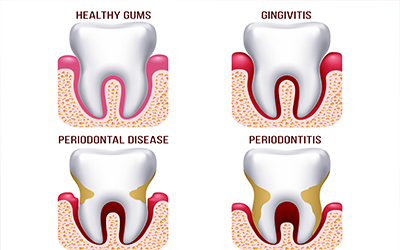Image Credit:
Image Credit:

Gum disease is a widespread oral health issue, but it can be remarkably easy to overlook. There are two reasons for this; Not only do we have a tendency to focus more on the health of our teeth, but gum disease can be painless in the early stages, making it more likely to go unnoticed. If you don't catch gum disease early on, it can have serious consequences and is the leading cause of tooth loss in adults.
Gingivitis is the name for the early stage of gum disease. If you are diagnosed with gingivitis, it can be treated with minimally invasive procedures. Once the plaque and bacteria have been scraped away, and the mouth has been thoroughly cleaned, a regular brushing and flossing regimen can reverse the effects of gingivitis.
Periodontitis is the advanced stage of gum disease. Periodontitis is treatable, but the procedures are more painful and invasive and include scaling and root planing, removing tartar and plaque from underneath the gum line.
Below are the most common symptoms of gum disease to be aware of:
At Severance Dental, we want to help you catch gum disease as quickly as possible, so you can avoid the uncomfortable procedures needed to reverse it. To make an appointment to discuss gum disease, please contact our Ault dentist today!
We don’t only care about your smile, We care about you! Follow us on our blog to review trending topic and resources for oral care.